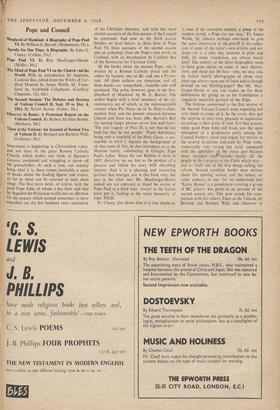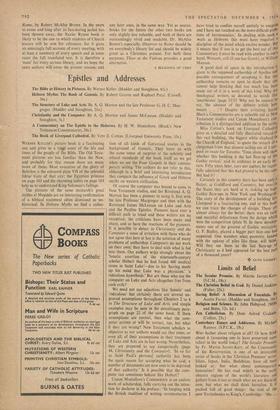Pope and Council
Shepherd of Mankind: A Biography of Pope Paul VI. By William E. Barrett. (Heinemann, 25s.). Apostle for Our Time: A Biography. By John G.
Clancy. (Collins, 21s.) The Mind of Pope Paul VI on the Church ?.nd the World. With an introduction by' Augustin, Cardinal Bea, edited from the Works of Car- dinal Montini by James Walsh, Si. Trans- lated by Archibald Colquhoun. (Geoffrey Chapman, 12s. 6d.) The Second Session: The Debates and Decrees of Vatican Council II, Sept. 29 to Dec. 4, 1963. By Xavier Rynne. (Faber, 30s.) Observer in Rome: A Protestant Report on the Vatican Council. By Robert McAfee Brown. (Methuen, 30s.) Thaw at the Vatican: An Account of Session Two of Vatican II. By Bernard and Barbara Wall. (Gollancz, 28s.)
SOMETHING is happening in Christendom today and not least in the great Roman Catholic Church, which makes one think of Epstein'S Lazarus, awakened and struggling to throw off the graveclothes. At such a time, our century being what it is, there comes inevitably a spate of books about the leading figures and events, so far as these can be assessed at such short range. The first wave dealt, of course, with the good Pope John, of whom it has been said that he 'beguiled the Protestant world into an affection for the papacy which seemed sometimes to have cancelled out the five hundred years separation
of the Christian churches,' and with that went several accounts of the first session of the Council he convened. And now as the third session finishes we have before us three lives of Pope Paul VI, three accounts of the second session and an anthology from the Pope's own works as Cardinal, with an introduction by Cardinal Bea of the Secretariat for Christian Unity.
Of the books about the present Pope, one is written by a Roman Catholic priest and the others by laymen, one an RC and one a Protes- tant. All three authors are American, and all three.books are sympathetic, readable and well produced. The palm, however, goes to the first, Shepherd of Mankind, by W. E. Barrett. The author begins with a brief summary of the cir- cumstances out of which, in the mid-nineteenth century when Pio Nono sat in St. Peter's chair, modern Italy and the present situation between Church and State was born. (Mr. Barrett's flair for turning happy phrases serves him well here : 'The real tragedy of Pius IX is not that he lost land but that he lost people.' Papal diplomacy, being only a stepchild of the Holy Ghost, is sus- ceptible to error.') Against the background of all that came of that, he then introduces us to the Montini family, culminating in Giorgio, Pope Paul's father. When the son Battista is born in 1897, therefore, we see him as the product of a process and follow his story with absorbing interest. And it is a pleasing and reassuring portrait that emerges, not in this book only, but also in the other two. Mr. MacGregor-Hastie indeed sets out expressly to dispel the notion of Pope Paul as a hard man, 'severo' as the Italian press put it, lacking in the warm humanity of John XXIII.
Fr. Clancy also shows him as a true shepherd, 'a man of the twentieth century, a priest of the modern world, a Pope for our time.' Fr. James Walsh, Si, labours perhaps over-hard to give the same impression of the pontiff in his collec- tion of some of the latter's own articles and ser- Mons—or is it only that sermons in print and bulk, let alone translation, are always heavy fare? The authors of the three biographies seem to have gone shares on some of their illustra- tions, and those not the best—why, we may ask, do Italian family photographs of about sixty years ago always seem out of focus and as though printed on wet blottifig-paper? But Mr. M ac- Gregor-Hastie at any rate makes up for these deficiencies by giving us as his frontispiece a singularly beautiful portrait of the Pope.
The bishops summoned to the first session of the Second Vatican Council went expecting not very much to come of it. In the event, they got the surprise of their lives, pleasant or unpleasant according to their point of view. For that session, while good Pope John still lived, saw the open emergence of a progressive party among the Council Fathers, vocal and urgent for reform in the several directions indicated by Pope John, numerically very strong but weak compared with the upholders 2_f the status quo because those included—an include—nearly all the people in the top posts in the Curia which was— and is—itself one of the first things calling for reform. Several excellent books were written about this opening session, and the author, or rather authors, of one—for we understand that 'Xavier Rynne' is a pseudonym covering a group of RC priests—has given us an account of the second session too. This now stands for com- parison with two others, Thaw at the Vatican, by Bernard and. Barbara Wall, and ,Observer in Rome, by Robert McAfee Brown. In the years to come and long after its fascinating jacket has been thrown away, the Xavier Rynne book is likely to be the one to which students of Church history will be sent for reference, for it gives an amazingly full account of every meeting, with at least a summary of every speech and in some cases the full translated text. It is therefore a 'must' for every serious library, and we hope the same authors will cover the present session, and any later ones, in the same way. Yet as source- books for the future the other two books are only slightly less valuable, and both of them are outstandingly vivid and readable, Dr. McAfee Brown's especially. Observer in Rome should be on everybody's library list and should be widely given as a Christmas present. For both these purposes, Thaw at the Vatican provides a good alternative.
A RELIGIOUS OF CSMV



































 Previous page
Previous page